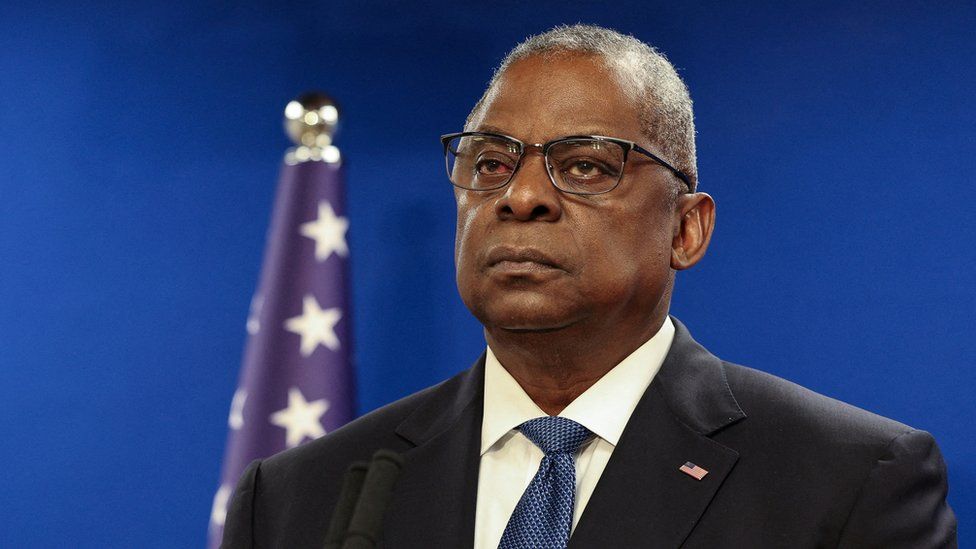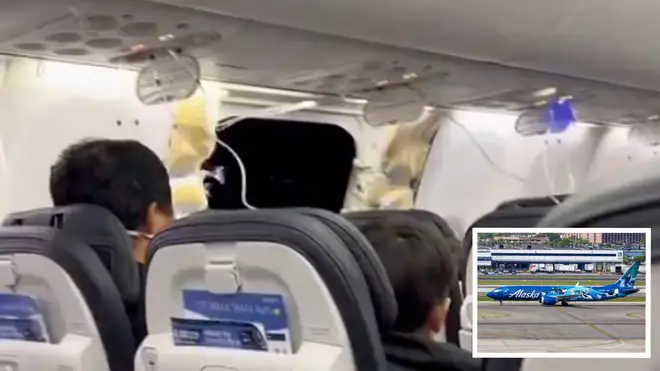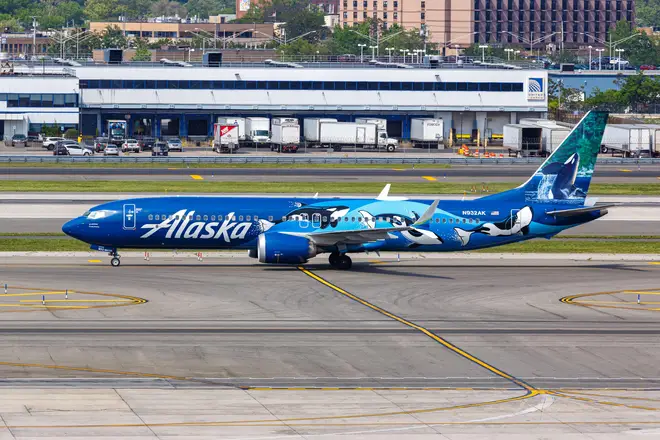Two journalists have been killed in an Israeli air strike in southern Gaza this morning. Hamza Wael Dahdouh, a journalist with Al Jazeera and Mustafa Thuria, a video stringer for AFP, were killed while travelling in a car, the health ministry and medics confirmed to AFP. Reports suggest the car was hit in the region between Rafah and western Khan Younis.
Hamza Wael Dahdouh’s father, Wael Al-Dahdouh, is Al Jazeera’s Gaza bureau chief and was also recently wounded in a strike. His wife and two children were killed by a separate Israeli strike in the initial weeks of the war.
At least 77 journalists and media workers were killed between 7 October, when the war started, and 31 December, according to the New York-based Committee to Protect Journalists.
There have been major civilian casualties from strikes on the southern Gaza town of Khan Younis this morning. Health officials in Nasser hospital said on Sunday that Israeli strikes on houses in the town had killed 50 people, with many images coming through this morning of babies and children who have been killed.

At least 64 people have been killed overnight and early on Sunday in Israeli airstrikes in Gaza, according to its Hamas-run health ministry. The death toll includes babies and children.
AFP reports:
Israeli bombardment [claimed] civilian lives in the southern city of Khan Yunis and in the Rafah area near the Egyptian border, where many of the territory’s displaced people have sought refuge, AFP correspondents reported.
Relatives were mourning the dead at Khan Yunis’ European hospital, among them Mohamed Awad, who wept over the body of a 12-year-old boy and listed other family members killed.
“My brother, his wife, his children, his relatives and the brothers of his wife - there are more than 20 martyrs,” he said.
The Israeli army - which said on Saturday it had “dismantled” Hamas’s military leadership in northern Gaza - reported that its forces had killed more “terrorists” in central Gaza, including in a drone strike in the Bureij refugee camp, a built-up urban area.
Two journalists have been killed in an Israeli air strike in southern Gaza this morning. Hamza Wael Dahdouh, a journalist with Al Jazeera and Mustafa Thuria, a video stringer for AFP, were killed while travelling in a car, the health ministry and medics confirmed to AFP. Reports suggest the car was hit in the region between Rafah and western Khan Younis.
Hamza Wael Dahdouh’s father, Wael Al-Dahdouh, is Al Jazeera’s Gaza bureau chief and was also recently wounded in a strike. His wife and two children were killed by a separate Israeli strike in the initial weeks of the war.
At least 77 journalists and media workers were killed between 7 October, when the war started, and 31 December, according to the New York-based Committee to Protect Journalists.
There have been major civilian casualties from strikes on the southern Gaza town of Khan Younis this morning. Health officials in Nasser hospital said on Sunday that Israeli strikes on houses in the town had killed 50 people, with many images coming through this morning of babies and children who have been killed.

Palestinians have been searching for survivors amid the rubble in Khan Yunis, southern Gaza, on Sunday after an Israeli airstrike.
Haitham Imad, a photographer for EPA, has been taking pictures this morning of the Brais family as they hunt for missing people among destroyed buildings.
It is not yet clear how many have died in the strike but other images filed this morning show multiple bodies being taken for burial from the mortuary at Nasser hospital, including babies.
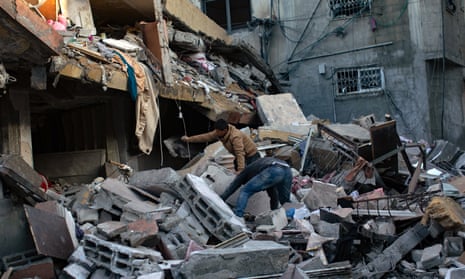
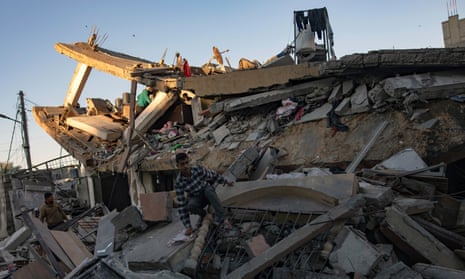

Jordan’s King Abdullah used his meeting with the US secretary of state, Antony Blinken, to push for an Israeli ceasefire. In a statement issued by the palace, he warned of the “catastrophic repercussions” of the continuation of Israel’s military campaign in Gaza.
In a sign that the talks had done little to water down Jordan’s position on the conflict, the monarch told Blinken that Washington had a major role to play to put pressure on Israel to agree to an immediate ceasefire in Gaza, Reuters reports.
Blinken is in Jordan as part of his week-long tour of the region. He also met the foreign minister and visited a World Food Program warehouse where trucks are being packed with aid to be delivered to Gaza.
Peter Beaumont is in Beirut, where the assassination of Saleh al-Arouri, deputy head of Hamas’s political bureau, has prompted fears that the war could spill over into Lebanon. You can read full report here, which includes powerful reportage from the city.
This is an extract of his analysis of the current fears for conflict spreading further in the region:
[fear of an all-out war between Hezbollah and Israel] has dominated debate in Lebanon and the wider region in the days since Arouri’s killing, even as a tenuous normality has returned to Beirut’s sprawling southern suburbs, a Hezbollah stronghold, in wake of the attack. While streets that emptied in the immediate aftermath of the strike have become busy again, anxiety lingers. The mood was summed up by Lebanon’s outgoing prime minister, Najib Mikati, who on Friday talked of “the danger of attempts to drag Lebanon into a regional war … with serious consequences, particularly for Lebanon and neighbouring countries”.On Saturday morning, as Hezbollah fired dozens of rockets into northern Israel, saying the barrage was only its first response to Arouri’s killing, Mikati’s warning took on an added resonance. The cross-border exchanges have highlighted the fact that, three months on, Israel’s war against Hamas is starting to bleed ever wider across the region.
Since 8 October, limited exchanges across the border – including airstrikes and drone attacks – have become a daily occurrence between Israel and Hezbollah, as well as other factions in Lebanon, inflicting casualties on both sides. Iran-backed groups in Iraq have stepped up attacks on US military bases, while Yemen’s Houthis – who, like Hamas and Hezbollah, have long enjoyed Iranian support – have launched long-range drones and threatened commercial shipping around key routes in the Red Sea. Last week, Islamic State claimed responsibility for two blasts which ripped through a crowd in southern Iran, killing at least 84 people, while a US airstrike in Baghdad killed the commander of an Iranian-backed Shia militia.
But it has been in Lebanon, above all, where the situation has become most dangerous, undermining a fragile understanding between Hezbollah and Israel that has persisted since the hugely destructive second Lebanon war in 2006.
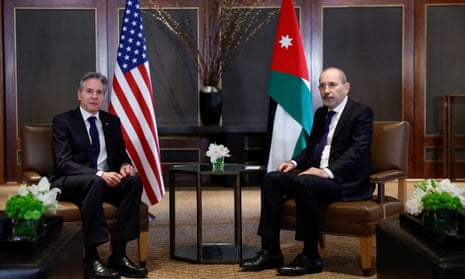
The US secretary of state, Antony Blinken, met King Abdullah II of Jordan and the country’s foreign minister, Ayman Safadi, in Aman on Sunday morning as part of a diplomatic push to prevent Israel’s war against Hamas from spreading elsewhere in the region.
Blinken’s position is that detailed plans for the post-conflict future of the territory need to be worked on, but Jordan and other Arab countries have so far been highly critical of Israel’s actions and argue that no long-term planning can happen until there is a ceasefire. Blinken is pushing Israel to adjust its military operations to reduce civilian casualties while boosting the amount of humanitarian aid reaching Gaza.
Blinken also toured a World Food Program warehouse in the Jordanian capital where trucks are being packed with aid to be delivered to Gaza.
After talks on Saturday with Turkish and Greek leaders Blinken said he wanted to prevent “an endless cycle of violence” as part of his week-long visit aimed at calming tensions in the region.
The Israeli military has signalled a shift away from its focus in northern Gaza, saying it has finished dismantling Hamas’ military infrastructure there.
Its spokesman, R Adm Daniel Hagari, said on Saturday night its forces would “continue to deepen the achievement” there, AP reported, adding that they would strengthen defences along the Israel-Gaza border fence and focus on the central and southern parts of the territory.
It comes as the US secretary of state, Antony Blinken, is on an official visit to the region. The US has repeatedly urged Israel to wind down its air and ground offensive in Gaza and focus on more targeted attacks against Hamas leaders, to prevent harm to Palestinian civilians.
Blinken is expected to put pressure on Israel to protect civilians in Gaza when he lands on Tuesday. In recent weeks, Israel had already been scaling back its attacks on northern Gaza and pushing south, where most of Gaza’s 2.3 million Palestinians are being pushed into smaller areas in a humanitarian disaster while Israeli airstrikes continue.
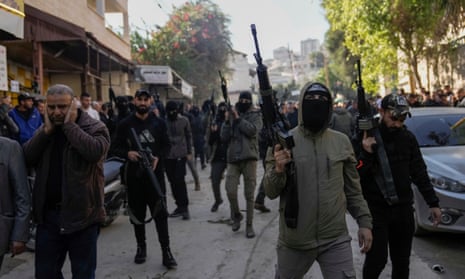
More detail has come in on this morning’s airstrike in the occupied West Bank. The strike killed six Palestinians in Jenin, the Palestinian health ministry said, while Israel said that one of its soldiers had been killed.
Here’s some more from Reuters, who spoke to people on the ground this morning:
Israel said its aircraft fired on Palestinian militants who had attacked troops in the city of Jenin, while the Palestinian ministry said the strike targeted people who had gathered at the site, and eyewitnesses said the attack happened as Israeli forces were withdrawing.
“One of the martyrs was decapitated,” Mujahid Nazzal, a Palestinian doctor and first responder at the scene, told Reuters.
“It seemed the missile directly hit him. Others had their limbs severed. A seventh person was seriously injured and taken by the ambulance.”
Another witness, Ahmed Suleiman, said, “The air strike happened at the entrance of Jenin in an area called Martyr’s Triangle. You can see the effects of the missile. Blood and body parts scattered everywhere.”
Four of those killed were brothers, according to family members.
An Israeli border police officer was killed and others wounded when their vehicle was hit by an explosive device during operations in Jenin, the Israeli military and police said.
A helicopter helped rescue them with covering fire, the military said, adding that an aircraft fired at a “terrorist squad that hurled explosives and endangered our forces, a number of terrorists were killed.”
Six people were killed early on Sunday during an Israeli airstrike in Jenin in the occupied West Bank, the Palestinian health ministry said.
“An Israeli occupation bombardment on a group of citizens killed six people in Jenin,” said the Palestinian Authority-run Ministry of Health, which is based in the West Bank.
The official Palestinian news agency Wafa reported early Sunday that a major deployment of Israeli forces was under way in Jenin.
Violence has intensified in the West Bank since Hamas launched an unprecedented attack on Israel from Gaza on 7 October. More than 300 Palestinians have been killed in the West Bank since the conflict broke out, according to the United Nations Office for the coordination of Humanitarian Affairs.
https://news.google.com/rss/articles/CBMihQFodHRwczovL3d3dy50aGVndWFyZGlhbi5jb20vd29ybGQvbGl2ZS8yMDI0L2phbi8wNy9taWRkbGUtZWFzdC1jcmlzaXMtbGl2ZS1pc3JhZWwtd2VzdC1iYW5rLWplbmluLXBhbGVzdGluaWFuLW1pbmlzdHJ5LWxhdGVzdC11cGRhdGVz0gGFAWh0dHBzOi8vYW1wLnRoZWd1YXJkaWFuLmNvbS93b3JsZC9saXZlLzIwMjQvamFuLzA3L21pZGRsZS1lYXN0LWNyaXNpcy1saXZlLWlzcmFlbC13ZXN0LWJhbmstamVuaW4tcGFsZXN0aW5pYW4tbWluaXN0cnktbGF0ZXN0LXVwZGF0ZXM?oc=5
2024-01-07 11:14:26Z
CBMihQFodHRwczovL3d3dy50aGVndWFyZGlhbi5jb20vd29ybGQvbGl2ZS8yMDI0L2phbi8wNy9taWRkbGUtZWFzdC1jcmlzaXMtbGl2ZS1pc3JhZWwtd2VzdC1iYW5rLWplbmluLXBhbGVzdGluaWFuLW1pbmlzdHJ5LWxhdGVzdC11cGRhdGVz0gGFAWh0dHBzOi8vYW1wLnRoZWd1YXJkaWFuLmNvbS93b3JsZC9saXZlLzIwMjQvamFuLzA3L21pZGRsZS1lYXN0LWNyaXNpcy1saXZlLWlzcmFlbC13ZXN0LWJhbmstamVuaW4tcGFsZXN0aW5pYW4tbWluaXN0cnktbGF0ZXN0LXVwZGF0ZXM
